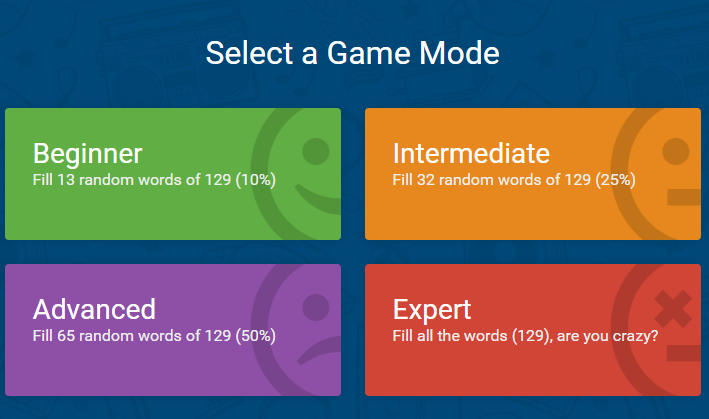As another Friday welcomes us with open arms, students everywhere discuss what they’re doing this weekend. Whatever you’ve got planned, it’s important to remember that learning English doesn’t stop when you step outside of the classroom, and practising in your free time is essential. But how can we practise and revise while having fun this weekend? Here are our 5 top tips to help get you started.
1. Lyrics & Listening Skills
Listening skills are some of the most challenging to develop and master, but have no fear! There is a way to practise listening for detail while treating yourself to some (possibly terrible) singing. LyricsTraining is a website which allows language-learners to search for a song, select a difficulty level, and fill in the gaps according to what they can hear. Let’s take a quick look at this useful site:


2. Be Wise & Revise
Make yourself a hot cup of tea and sit down with the notes you took in class this week, because it’s time to review what you’ve learnt. Think about these questions while you look at your notes:
Can you remember all of the new vocabulary you discussed? Make a list of what you remember and check it against your notes.- Do you remember the meaning of each piece of vocabulary? Try writing sentences or a short paragraph using some of these new words.
- Where is the primary stress in each word? Break it down into syllables and underline the ‘strongest’ sounding part. (e.g. revise – revise)
3. Read
Reading is a fantastic way to develop your reading skills and discover new vocabulary, phrasal verbs, and sentence structures among other things. Of course, it’s important to choose reading material which is right for your level; why not ask a teacher for some suggestions?

4. Watch a TED Talk
TED Talks are very informative, relatively short videos covering almost any topic you can imagine. These talks are generally intended for native speakers, so they are ideal for strong intermediate to advanced level learners.
If TED Talks are slightly too challenging for you at the moment, you can still watch some informative videos (and read vocabulary-packed articles) about history from all around the world on History.com.
5. Host a DVD Night
This is a fantastic way to practise your listening skills and socialise with your peers! Organise a DVD night, grab some snacks, and get comfortable with your friends and classmates while you follow a film entirely in English. If you can, watch the film without subtitles for a challenge. Alternately, if your budget allows, why not head outside and watch a new film at the cinema?

Interested in boosting your English skills by using more phrasal verbs? Download our new Phrasal Verbs e-Book for FREE! It will show you many examples of the most common phrasal verbs and also help you to understand their meanings.
[hs_action id=”2151″]



